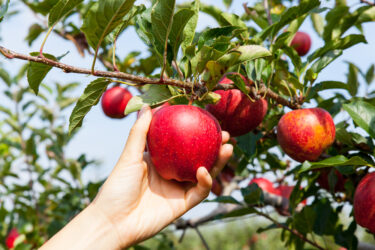Free Market “Crimes”: If the Gov’t Isn’t Happy… No One Can Be Happy
Joel Salatin|November 22, 2022

A Note From Amanda: Today, Joel highlights another example of government overreach and shows us why even though the free market knows best… it’s not enough. In the name of protecting workers… the government ends up hurting everyone. Read on below.
The war against the gig economy is heating up. A kissing cousin to that controversy is overtime rules on farms.
This trend hasn’t gone national… yet. But’s it’s on its way.
New York is the latest state to join a march started by California and Washington.
Historically, agriculture has been exempted from overtime rules due to the seasonality of the work. All farmers know that sometimes we work up to 90 hours a week and other times we hardly work at all. Farming is an inherently cyclical vocation, and reasonable people recognize that labor demands will vary.
It’s far different from factory work.
Farms that require seasonal fruit picking are especially vulnerable to this variability. Of all farming outfits, these are the most cyclical. On our farm, the most time-intensive job is haymaking, but that pales in comparison with picking apples. Orchardists often rely on temporary, nonimmigrant foreign workers, who come voluntarily each year to do this seasonal work.
Many of them come back to the same area, even the same farms, for a few months each year to earn as much as they would working for a couple of years or more in their native countries.
It’s a wonderful way for farmers to meet a heavy short-term workload. And it allows workers to work long days for a few months, then return to their families and enjoy hearth and home for a few months.
Nobody coerces either party into making this agreement. Orchardists offer what it takes to get these workers, and the workers appreciate the opportunity.
You’d think that if two consenting adults come to a voluntary agreement, their neighbors wouldn’t see a compelling reason to interfere.
Not in today’s world.
I know some folks may take offense at my use of the word “neighbors,” but I think that helps humanize this discussion.
Our neighbors – all of us – make up society, and as a society, we choose our form of governance. Whatever government a society has reflects the mores and values of that society. Certainly societies can evolve – look at what is currently happening with the female head-covering protests in Iran.
Such changes indicate that sometimes a society moves faster than its governance. Sometimes governance moves faster than its society.
Eventually, though, governance reflects society.
Who’s Happy
In the instance of fruit picking, we should have a farmer and a picker in perfect harmony. They agree on their deal, but their neighbors think something about it is unfair.
It’s a case of “I’m happy and you’re happy, but the government ain’t happy.”
Employment-overseeing meddlers want to intervene in this harmonious, voluntary and contractual arrangement and require time and a half for all hours over 40 pickers work in a week.
It doesn’t matter that these folks don’t work at all for half the year. It doesn’t matter that the employer has no work for them for half the year. It doesn’t matter that their total hours worked would average out to 40 hours a week if spread over a year.
None of that matters. All that matters is the hours worked this week.
These meddlers would rather see orchardists go out of business and pickers lose their half-year employment opportunities than see them work more than 40 hours a week… ever.
These folks are away from home. In most cases, they don’t own their living quarters. In their home countries, with fewer employment opportunities, they might have to work 80 hours a week just to survive. With this seasonal arrangement, they can work 60 hours a week half of the year and not have to work at all the other half.
That’s a fair trade, and it’s exactly the way they see it.
The workers aren’t agitating for this. Mario Cilento, president of the New York State AFL-CIO, said, “It feels good that workers who have always been treated as second-class citizens will finally be treated with the dignity and respect that they deserve.”
What do workers say?
“We came to work. Our boss gives us hours so we can get a decent paycheck,” said a Jamaican who has made the trek to a New York orchard every year since 2008, according to The Wall Street Journal.
What possesses neighbors to intervene in the agreements made by consenting adults? If the workers weren’t getting enough pay, they’d go somewhere else. This is the invisible hand of the market, making adjustments and maintaining balance in supply and demand.
But many people aren’t satisfied with market adjustments to supply and demand. They want to intervene long before one side indicates its dissatisfaction.
The war on the gig economy is similar.
Nobody holds a gun to an Uber or Lyft driver’s head and compels her to do a side hustle. A driver is completely free to come and go, enter and exit, work one hour or 60 hours.
Why does the freedom to choose our labor situation unleash such hostility?
Consent is one of the most beautiful things in the human experience, whether it’s expressed in the bedroom or an apple orchard.
Folks who can’t let orchardists hire their workers – and who won’t let happy workers take advantage of an opportunity – are simply sophisticated Peeping Toms, peering and meddling in places where they have no business.
Be assured that this movement will skew prices in the marketplace, further dampen domestic production, and eliminate opportunities across the food and farming sector.
All because a neighbor can’t abide two adults making a deal.

Joel Salatin
Joel Salatin calls himself a Christian libertarian environmentalist capitalist lunatic farmer. Others who like him call him the most famous farmer in the world, the high priest of the pasture, and the most eclectic thinker from Virginia since Thomas Jefferson. Those who don’t like him call him a bioterrorist, Typhoid Mary, a charlatan, and a starvation advocate. With a room full of debate trophies from high school and college days, 12 published books, and a thriving multigenerational family farm, he draws on a lifetime of food, farming and fantasy to entertain and inspire audiences around the world.



